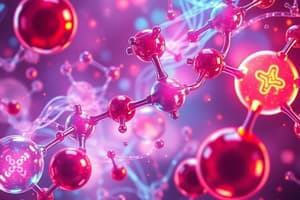Podcast
Questions and Answers
What is chemistry?
What is chemistry?
The study of matter and the transformation it undergoes.
Which of the following are main branches of chemistry? (Select all that apply)
Which of the following are main branches of chemistry? (Select all that apply)
- Inorganic Chemistry (correct)
- Biochemistry (correct)
- Organic Chemistry (correct)
- Psychology
What does analytical chemistry deal with?
What does analytical chemistry deal with?
The analysis of different substances including separation, identification, and quantification.
What type of analysis determines the identity of a sample?
What type of analysis determines the identity of a sample?
What types of analysis are included in classical methods?
What types of analysis are included in classical methods?
What does volumetric analysis rely on?
What does volumetric analysis rely on?
Which of the following is NOT a type of volumetric analysis?
Which of the following is NOT a type of volumetric analysis?
What is the primary importance of analytical chemistry?
What is the primary importance of analytical chemistry?
Flashcards are hidden until you start studying
Study Notes
Course Aims
- Students will be able to explain theoretical bases and applications of acid-base, preciptimetric, complexometric, and gravimetric reactions.
Assessment
- 10% Midterm exam
- 5% Activity
- 25% Practical exams
- 10% Oral exams
- 50% Final written exam
Assessment Schedule
- Midterm exam in week 7
- Activity in week 11
- Practical exams in week 13
- Final written exam in week 15
- Oral exams in week 15
What is Chemistry?
- Everything is a chemical
- Examples: table salt (sodium chloride, NaCl), table sugar (sucrose, C12H22O11C_{12}H_{22}O_{11}C12H22O11), clothes (wool, cotton, polyester), body (lipids, proteins, carbohydrates, DNA/RNA)
Main Branches of Chemistry
- Organic Chemistry
- Inorganic Chemistry
- Physical Chemistry
- Biochemistry
- Analytical Chemistry
What is Analytical Chemistry?
- Branch of chemistry focused on analyzing different substances
- Involves separation, identification, and quantification
Types of Questions in Analytical Chemistry
- Qualitative analysis: What is in the sample? (identity)
- Quantitative analysis: How much is in the sample? (amount)
Importance of Analytical Chemistry
- Medical diagnosis (e.g., serum cholesterol, urine ketones, disease markers, blood glucose levels)
- Forensic survey (e.g., DNA fingerprinting, poison analysis in blood samples)
- Soil testing (e.g., mineral and nutrient analysis, pesticide residues)
- Food industry (e.g., food contaminant analysis, preservative concentration)
- Pharmaceutical industry (e.g., drug shelf life determination, adulterant detection, drug impurity analysis, active constituent concentration)
Analytical Chemistry as the “Central Science”
- Central to scientific fields such as:
- Medicine
- Toxicology
- Pharmacology
- Biochemistry
- Biology
- Botany
- Agriculture
- Ecology
- Neurology
- Physiology
- Psychology
- Paleontology
- Geology
- Physics
- Astronomy
- Meteorology
- Electronics
- Archaeology
- Metallurgy
- Engineering
Analytical Chemistry Branches
- Qualitative analysis
- Quantitative analysis
- Classical "Wet" analysis
- Gravimetric analysis
- Volumetric analysis
- Instrumental analysis
- Optical methods
- Separation methods
- Electro-analytical methods
- Classical "Wet" analysis
Classical Methods (Wet Analysis)
- Analysis done generally in the liquid phase without advanced instrumentation
- Effective and widely used
- Includes volumetric analysis and gravimetric analysis
Instrumental Analysis
- Uses specific apparatus for measurements with computer processing and data analysis
- Depends on analyte's physico-chemical, optical, and electrical properties
- Examples: spectrophotometric, potentiometric, and conductometric methods
Volumetric Analysis (Titration)
- Measures the volume of a solution containing sufficient reagent to react completely with the analyte
- Used to determine the unknown concentration of a known reactant
- Common technique is titration
Gravimetric Analysis
- Measures the mass of the final product of a reaction after isolation in pure and stable form with a definite chemical structure
Classifications of Volumetric Analysis by Reaction Type
- Titration
- Acid-base Titration
- Redox Titration
- Precipitation Titration
- Complexometric Titration
Acid-Base Titration
- Uses a neutralization reaction between an acid and a base
- Involves a pH change, monitored using an indicator
- Example: Titration of a strong acid with a strong base
- Key factors: equivalence point, end point, indicator selection
Redox Titration
- Uses a reaction involving electron transfer (oxidation and reduction)
- Requires a suitable redox indicator
- Example: Titration of potassium permanganate with iron (II) sulfate
- Key factors: standard oxidizing or reducing agent, stoichiometry
Precipitation Titration
- Forms a precipitate in the reaction
- Utilizes a precipitation reaction between two reactants
- Example: Titration of silver nitrate with sodium chloride
- Key factors: solubility product, common-ion effect
Complexometric Titration
- Forms a soluble complex between the analyte and a reagent
- Involves a complex formation reaction between metal ions and a complexing agent
- Example: Titration of calcium ions with EDTA
- Key factors: complex formation constant, pH control
Gravimetric Analysis
- Based on weighing the final product of a reaction after isolation in pure and stable form with a definite chemical structure
- Includes precipitation gravimetry, volatilization gravimetry, and electrogravimetry
- Example: Determination of chloride content by precipitation as silver chloride - Key factors: solubility of the precipitate, purity of the precipitate, stoichiometry of the reaction
Key Terms in Analytical Chemistry
- Analyte: The substance being analyzed
- Reagent: A substance used to react with the analyte
- Standard solution: A solution of known concentration
- Indicator: A substance that changes color to indicate the endpoint of the reaction
- Equivalence point: The point at which the analyte and reagent have reacted in stoichiometric amounts
- End point: The point at which the indicator changes color
General Steps in Volumetric (Titration) Analysis
- Preparation of standard solution
- Titration procedure
- Calculation of results
General Steps in Gravimetric Analysis
- Precipitation of the analyte
- Filtration, washing, and drying
- Weighing the precipitate
- Calculation of results
Studying That Suits You
Use AI to generate personalized quizzes and flashcards to suit your learning preferences.




